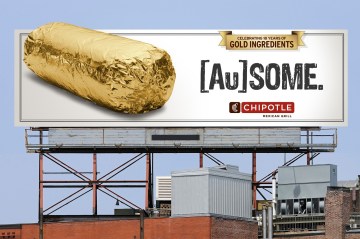Chipotle rarely makes changes to its menu, so it was a big deal this week when the burrito chain said it would add tofu-based “sofritas” to stores nationwide. Vegans and vegetarians now have a legitimate burrito filling beyond free-of-charge guacamole–finally.
As a tech writer who is far too fascinated by fast food, the news got me thinking about Chipotle and its parallels to a certain tech company.
Chipotle’s approach to fast food is undeniably Apple-like, and its resulting success has produced just as many envious competitors, none of whom have quite been able to capture Chipotle’s magic. (I’m thinking Qdoba is basically Samsung here.) Perhaps it’s no coincidence that both Apple and Chipotle have stock prices above $500 per share, and no shortage of haters who think those prices can’t last.
I can’t claim to be the first one to make the Chipotle-Apple connection. That honor, I believe, goes to Matthew Yglesias, who wrote a “Chipotle is Apple” piece for Slate in 2012:
In many ways, the Chipotle burrito is very similar to the iPhone. Founder Steve Ells invented a way to maintain the basic speed and experience of the standard fast-food experience and make the quality of the food a little better. The better food costs a bit more money, but consumers turn out to be happy to pay a premium for a superior product.
Yglesias draws some clever lines between burrito and tech product supply chains, but his comparison to Apple in particular doesn’t go far enough. Chipotle’s Appleness isn’t just about higher quality food at premium prices. If it was that simple, every fast-casual restaurant would be as successful and loved as Chipotle. But as we know, being like Apple is a lot harder than it looks.
A major factor in Chipotle’s success, one that competitors don’t seem to get, is its focus. The menu is small, and never includes limited-time, promotional items. That means your options are slimmer than other chains–no mole sauce or three kinds of queso like you get at Qdoba, or raw olives or grilled mushrooms as offered at Moe’s–but it’s basically impossible to make yourself a bad burrito.
Having a small, focused menu doesn’t just help diners. It also keeps Chipotle from wasting money. Mark Crumpacker, Chipotle’s Chief Marketing Officer, explained the company’s strategy in a Bloomberg mini-documentary last year:
One of the things that makes Chipotle financially successful is our focus, our simple menu and the fact that we don’t constantly add new menu items. Therefore, we don’t have to spend a lot of advertising dollars around each one of those menu items, and we don’t have to try to teach our crews how to prepare new menu items, which would actually dumb everything down.

Just as Chipotle is careful not to overextend, Apple is famous for rejecting bells and whistles that don’t make for a great experience. When every Android phone maker started pushing NFC for file sharing and mobile payments, for instance, Apple correctly recognized it as a useless gimmick and ignored it. When Android phones started including 4G LTE connectivity, Apple held off until the technology was no longer a battery hog.
It’s not unlike how Chipotle spent a year testing and refining its sofritas recipe before rolling it out nationwide. Maybe the company could have offered something sooner, but if the product wasn’t good enough, it might have just scared vegans and vegetarians away permanently.
Again, this level of focus leaves you with fewer options as a customer. You can create more flavors in a Qdoba burrito than you can in a Chipotle one–and for some people, more stuff is what matters most–but if you want the highest-quality overall experience, you go with Chipotle*. Or you go with an iPhone, which (almost) always comes out on top in customer satisfaction surveys.
Marco Arment articulated this mentality in a post from a year ago:
Where Apple says “You can’t do that because we think that would suck,” Microsoft and Android usually say, “You can do whatever you want, even if it sucks.”
Focus and simplicity are the biggest parallels between Apple and Chipotle, but there are other similarities. Chipotle and Apple both have an eye for design, coming up with minimalist aesthetics that rivals are never quite able to match. And neither company spends much on marketing compared to the competition.
Also, I could probably write a whole other article about Chipotle co-founder Steve Ells, whose attention to detail and unwillingness to put profits over customer satisfaction remind me of another Steve. One quote in particular from that Bloomberg documentary sticks out as something you might hear from an Apple executive, if not for the food-specific references:
If I had thought about making money, instead of creating a great restaurant experience, I would have thought, oh, I need to buy cheaper ingredients. I need to buy things that are highly processed and easy for an inexperienced and low-performing team to consistently produce.
Of course, Apple and Chipotle aren’t perfect, nor are they for everyone. I’m glad to live in a world where I can eat a queso burrito and buy a phone whose app store isn’t a walled garden. No one should cheer for a world where Chipotle is the only burrito joint and Apple is the sole purveyor of smartphones, even if they are the most popular. But if you’re an Android/Windows user who’s unable to understand the appeal of Apple products, maybe a few burritos will help.
*There is one major flaw in this whole analogy: A good burrito al pastor from any decent Mexican restaurant easily trumps anything that Chipotle offers.

